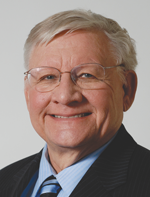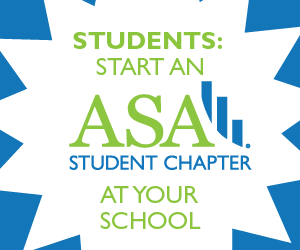 Ronald Helms
Ronald Helms
is the chief scientific officer and co-founder of Rho, a contract research organization based in North Carolina, and professor emeritus of The University of North Carolina Department of Biostatistics.
“Okay,” you say to yourself. “I’ve been a student for umpteen years, I’ve lived la dolce vita, I’ll graduate soon, and now I’ve got to get a job. I’m well trained—I know a lot about statistics—but how do I get a really good job?”
First, as they say, the good news: If you’ve been a good student, which is likely because most professional statisticians were good students, you already have most of the skills you need to get that great job. More good news, which you probably already know, is that there are more good jobs for good statisticians than good statisticians to fill them. Employers must compete for good statistician employees. You can expect to earn good pay, good benefits, good working conditions, and so on. That’s not good news; that’s great news!
Now the bad news: Those great professors who taught you all that cool statistical stuff probably didn’t teach you how to find and win a great job. That’s okay. This topic is pretty mysterious to many professors. But remember, you’ve been a good student, which means you learn quickly and thoroughly. You also can quickly learn how to find and win a great job. Let’s start with finding an employer.
Do Your Homework
Search the Internet and think carefully about your own preferences and feelings to find answers to the following questions, then perform the listed tasks.
Would I prefer to work in academia, industry, or government?
If you’ll be called doctor, you may get to choose any of the three, but most bachelor’s and master’s graduates choose between the latter two. This article is far too short to give much help on those, but I have found students are often biased toward academia, partially because it’s more familiar—students have actually lived in academia for years.
What do industry or government statisticians do day by day?
Many students have only a vague notion of what industry or government statisticians actually do day in and day out, or that, in addition to typically having higher salaries and better fringe benefits, many nonacademic statisticians have jobs that are personally fulfilling and rewarding, as well as interesting and fun.
How to answer the question? Start with the obvious: Google. Then, try a “networking” approach: Talk to a local friendly statistician. It’s relatively easy. Just email the president or chair of your nearest ASA chapter, or talk to the person in your statistics department who handles alumni affairs and ask her or him to find nearby industry or government statisticians who would be willing to spend an hour or so talking with you about jobs in their environment. You’ll find that you are about to join a community—professional statisticians—many of whom really like their jobs and love to talk about them. Talk to statisticians in a variety of work environments that interest you. Ask questions. Take notes. Jobs vary, quite a lot actually, so get a reasonable sample. Go “maximum likelihood”—drill down and get more information about jobs that seem more appealing to you, the ones you have a higher likelihood of enjoying.
Why would I prefer to work in government, industry, or academia?
Write out the pros and cons—to you, personally—of each choice.
Which geographic locations do I prefer?
Some years ago as graduation was approaching, I was all set to take a great job with a great company in Philadelphia. Then my wife said, “I’m not moving to Philadelphia.” Bottom line: We didn’t. Write out the pros and cons—to you, personally, and to significant others—of each general geographic location, and then rank order your choices. Try to keep several options open.
-
Make a list of your potential employers. Populate your list with institutions that are actively recruiting for statisticians at your training and experience levels to work in areas that are of interest to you and, of course, that meet the criteria in the previous questions.
-
Rank your list of potential employers from most to least desirable. Be prepared to revise your rankings as you learn more about them.
- Study your top five. Mine the information on potential employers’ websites to learn which ones particularly appeal to you.
- Learn about each potential employer’s core purpose and ideology. Are they real, or just for marketing? What is the corporate culture like? Is this employer a good fit for you?
- Work the network. If alumni from your statistics department work at your current favorites, call them to talk “off the record” (if they’re willing) about their employer, their work environment, their job. Re-rank your list of potential employers and become familiar with your top five.
Relentless Preparation
Former New York City Mayor Rudy Giuliani said, “You can’t prepare for all the unknowns. You just have to be flexible. You have to be relentlessly prepared.” I believe being “relentlessly prepared” is a primary key to success in getting that job, being a successful student, and many other areas of life. In my experience, relentless preparation for communication is critically important to statisticians.
Completing the assignment above produced your personal list of potential employers. Now it’s time to prepare to communicate. There is much to communicate, and you must do it effectively!
Potential bad news: Most employers place great importance on a statistician’s communication skills, both written and verbal, especially in the English language.
Potentially worse news: Lots of statisticians with great statistics skills don’t have good communication skills.
Major point: Be completely honest with yourself and potential employers. If your communication skills are good or excellent, great! If not, remember that you are a good student. You’ve tackled and learned statistics, one of the toughest of academic disciplines.
Good communication skills can be learned, and you know you’re good at learning. But if you need to learn communication skills, you must make a plan for how you will do that and then go and actually do it. I can’t tell you how to do this, but I can tell you it is important that you identify your communication shortcomings and initiate action to correct them before you start contacting potential employers.
An interview, a review of your writing, or a brief presentation by you will make your communication shortcomings readily apparent to a potential employer. The employer will be much more likely to de-emphasize these issues if you honestly include something like the following in your CV or résumé: “My studies have focused on statistical technology, leaving little time to develop my communication skills. I am determined to improve my communications skills. Indeed, I have already enrolled in a course that I will complete by …. After completing the course, I will conduct an objective evaluation and do whatever is necessary to further improve my skills.” (Hint: Don’t plagiarize this text. Ask a friend with good English-language communication skills to help you rewrite it to suit your specific circumstances.) It is important that you be able to say, honestly, that you acknowledge the problem and have already initiated action to correct it.
Next, the résumé. Trite but true: “You don’t get a second chance to make a first impression.” And the résumé often makes the first impression on a potential employer. Go online and learn how to write an effective résumé (2–4 hours). Write it (2–4 hours). Go to your university’s placement office (or similar) and ask for professional help polishing it (2–4 hours). Use it with confidence.
Next, the cover letter “template.” Your cover letter, which will probably be sent as an email message with your résumé attached, will be your initial response to an employer’s advertisement. (The first sentence in the paragraph on the résumé also pertains to the cover letter/email.) Use the same procedure you used for the résumé to prepare a cover letter template that you will use as a starting point for preparing an actual cover letter to a potential employer.
Develop your telephone interviewing skills. Many employers use telephone interviews to “screen” potential employees. Often, the interviewer is a human relations person, not a statistician, who will be less interested in your statistical knowledge than (1) your ability to communicate effectively via telephone, (2) whether you really meet the minimum qualifications for the position for which you have applied, and (3) whether there are any obvious reasons why the organization should not put more resources into recruiting you (for example, you were convicted of violent crimes against fellow students and are hoping to get out of prison in the near future).
Performing well in a telephone interview is a skill a good student, like you, can master. Study about phone interviews by using the Internet. Find someone in your statistics department who interviews potential staff members (or faculty) and ask that person to help you practice. Then practice. Evaluate your shortcomings, work on overcoming them, and practice again. Polish your skills.
Develop your face-to-face interviewing skills. An employer who is interested in you will want you to visit their offices and participate in personal interviews conducted by one or more potential supervisors, potential co-workers, and one or more human relations person. The technical folks—supervisors and co-workers—primarily want to evaluate how well you would perform on the job(s) and whether you would fit in with potential colleagues. They will have your cover letter, résumé, and information about your statistical training. They will want to discuss your statistical skills and any important ancillary skills—such as your ability to program in SAS, R, or similar—and evaluate your level of knowledge about the subject-matter areas in which you apply your statistical skills. They also will answer your questions about the position(s) and work environment.
Some larger companies administer a written exam to evaluate statistical knowledge and skills, but this is unusual and you would be forewarned. The human resources staff will evaluate your paper qualifications for the open position(s); check for disqualifying matters; and answer your questions about salary level, fringe benefits, etc.
Performing well in personal interviews is a skill that you, as a good student, can learn. The learning process is essentially the same as learning telephone interviewing skills, but the actual skills are somewhat different. For example, it’s important in a personal interview to maintain eye contact with your interviewer. Follow the process described previously for developing telephone interviewing skills to develop and polish your personal interviewing skills. Go!
You’re now well prepared—hopefully “relentlessly prepared”—to go after the top three potential employers on your list. This is no time for a shotgun approach. It’s usually too difficult to juggle more than three potential employers at a time, and you want to pursue your top choices seriously.
Use your cover letter template and knowledge about your top choices to prepare a cover letter for each. The letters will be similar, but adapted to each organization. Have your cover letters reviewed by a friend who is accomplished in English communication or by someone in your university’s placement office. Misspelled words or incorrect grammar scream to a potential employer that you are not careful when working on the most important matters—not good for a professional statistician!
Translating a cover letter template into a good cover letter for a specific position can be an art form. Part of the letter is as cut-and-dried as, for example, carefully identifying yourself, specifying your contact information, and stating explicitly the position you are applying for (and how you came to know about it). But this is your only chance to make a first impression, and you want to convince the reader—quickly—that you are a great candidate. Accordingly, your letter will include a paragraph with the theme (not explicitly stated) “I am a great candidate for this position.” The art is to brag about your qualifications without coming across as bragging. If that is beyond your communication skills, don’t worry about it; just state the facts and let them speak for themselves.
Submit your materials exactly as instructed by the potential employer. However, if you submit by email, request a return receipt to ensure the email was received. If you don’t get a “received” email, re-send your email and follow up with a telephone call to the addressee. Keep at it until you have definitive knowledge that your materials were received by the right person.
In addition, if you are acquainted with some of the employer’s statisticians, it’s okay to work the network. Send them an email informing them that you are applying for a position, that you are very interested in the position, and that their organization is in your top three. Also, attach copies of your cover letter and résumé. Don’t ask them to intercede for you; just let them know you think working at their organization would be a win-win situation and you would enjoy being their colleague.
In the process of writing this article, I discussed it with a pharmaceutical industry colleague who provided the following helpful hints for personal interviews. I hope they amuse you, at least a little.
-
Be on time. (Unless you are stuck in horrible traffic that has the city so clogged that you can’t move, in which case use your cell phone to keep them apprised. Don’t sweat it, you’ll be forgiven, and if you aren’t, then you don’t want to work there anyhow.)
- Be neat and tidy. (Bathe, use deodorant, no mini-skirts, no sheer blouses, no pants around your ankles.)
- Act interested. (Giving abrupt short answers and tapping your fingers is not helpful.)
- Say why you are interested in drug development. (But don’t supply that you like working in this field so you can take the drugs you test—and this new antidepressant really works!)
- Don’t be arrogant. (If you think you are the best candidate in the job market this year, perhaps it’s best not to share your perspective.)
- Tell us about your accomplishments. (Almost finished your degree, then almost finished this big project, then almost finished that … we’ll almost hire you in that case.)
- Tell us about yourself. (But if you show undue interest in the local watering hole and how acceptable it is to leave the building for said destination for lunch … well, we might want you sober in the afternoon.)
Good luck!




Jobless
Thank you
Recently I’ve been in capital of Poland for a while and I have to say this beautiful place made a huge impression on me. You have to visit it 😉
good advise but statistics jobs are too scarce for me
how can i get one?